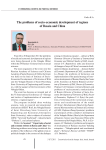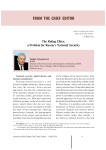Статьи журнала - Economic and Social Changes: Facts, Trends, Forecast
Все статьи: 1553

The priorities of the energy infrastructure modernization in rural areas of the Komi Republic
Статья научная
The article presents the problems of development and modernization of energy infrastructure priorities in rural areas of the Komi Republic. For the most part of rural population the achieved level of energy supply is the necessary minimum for the needs, and it has the low parameters of the energy and economy efficiency. The main directions of the rural energy supply modernization should be: the gas supply system development, the electric grid capacity growth and the construction of the modern small energy technologies (small central heating and power plants, modular boiler plants, efficient solid fuel boilers).
Бесплатно

The priorities of the public policy in the northern regions
Статья научная
The article deals with the current economic trends in the Russian North. It shows the stabilizing role of economic systems of northern regions in the national economy and shortcomings of the state regulation of activities under the specific nature-climatic conditions. The necessity and directions of making changes and additions in the tax and budget legislation as well as in the normative acts on state guarantees for the persons working and living in regions of the Far North are substantiated.
Бесплатно
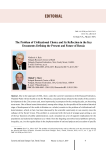
Статья научная
Due to the approach of 2024, when, under the current Constitution of the Russian Federation, Vladimir Putin will not be able to run for President, conceptual issues related to the results of the country's development in the 21st century and, most importantly, its prospects for the coming decades, are becoming more acute. One of these issues (determined, among other things, by the specifics of the modern historical stage of development of the world civilization as a whole) consists in the problem of civilizational self-determination, which, in fact, has been discussed by the scientific community in our country since the collapse of the Soviet Union. This problem is connected with the lack of strategic goal-setting as one of the key functions of public administration; such a situation has a lot of negative implications for the population and national development as a whole: from the lingering unresolved social problems (poverty, inequality, etc.) to the regular delays in the implementation of national projects and execution of specific orders of the head of state. In addition, according to the results of federal and regional studies, Russian society does not have a distinct cultural and value-based vector of development; moreover, against the background of the relentless need to increase the standard of living and achieve social justice, Russian society is increasingly becoming a consumer society with all its key shortcomings such as obsession with the material component of life, the desire to achieve personal success, ignoring the historically established norms of morality, etc. In the context of the issue of civilizational choice becoming more important as well as a wide range of problems caused by its absence, we analyze the Constitution of the Russian Federation and the National Security Strategy of the Russian Federation - the key federal documents that reflect basic principles of the existing dynamics and future prospects of national development. We come to the conclusion that the ruling elites do not work to form the spiritual and moral foundations of Russian society; consequently, the goals they set are focused on solving material problems only, which makes public administration similar to corporate governance. This poses one of the key threats to national security and national development and makes it necessary to hold a broad discussion initiated primarily by the government and aimed to consider practical possibilities and prospects for the implementation of the basic principles of the social state contained in the Constitution of the Russian Federation.
Бесплатно
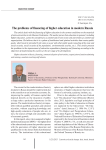
The problems of financing of higher education in modern Russia
Статья научная
The article deals with the financing of higher education in the current conditions on the materials of state universities in the Russian Federation. The author proves that education in general, including higher education, cannot be considered as a commercial service sector and universities as commercial organizations. He believes that it is a sphere of intellectual and spiritual activities that creates public goods, which must be provided by the state on a par with other public goods (ensuring of the state and social security, social security of the population, environmental security, etc.). This article presents the problems in the improvement of education expenditure planning and financing according to the objectives of modernizing the country at the new stage of its development.
Бесплатно
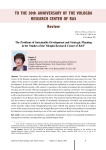
Статья научная
The article introduces the readers to the most important studies of the Vologda Research Center of the Russian Academy of Sciences, which celebrated its thirtieth anniversary this year. The subject of the Center’s scientific research was formed during a rather difficult period of the country’s development. In the early 1990s, the Russian Federation embarked on a path of market transformation. The adopted liberal concept of the country’s transition to the market proclaimed the incompatibility of the plan and the market. Planned management methods were rejected everywhere. The management paradigm adopted was based exclusively on market mechanisms for regulating socio-economic processes at all levels of government. This resulted not only in the increase of negative trends in the economy and social sphere, but in Russia’s descent into the abyss. The situation required finding ways out of the crisis and the country’s transition to a model of sustainable development. Scientific and methodological support for solving this problem at the regional level has become the core in determining the subject of the scientific studies of the Vologda Research Center of RAS. The purpose of the work is to make a review of the research carried out by the Vologda Research Center of RAS on the problems of sustainable development and strategic planning as one of the most appropriate tools for solving this issue.
Бесплатно

The quality of labor potential outside large cities
Статья научная
Sustainable development of rural areas in the context of reducing labor force caused by the natural loss of population and migration outflow to major cities is possible to ensure only through economic modernization, enhancement of the quality of labor potential and improvement of its efficiency. The goal of the research presented in the paper is to assess labor potential quality in the territories outside major cities. The information base of the work is the data of the monitoring of the qualitative state of labor potential of the Vologda Oblast population, an unprecedented longitudinal sociological research carried out by Vologda Research Center of RAS since 1997. The questionnaire survey takes place in eight districts of the Oblast and in the cities of Vologda and Cherepovets. The sample size is 1,500 people of working age. The assessment technique is based on the concept of qualitative characteristics of the population developed at RAS Institute of Socio-Economic Studies of Population and allows us to evaluate in index form (from zero to one) eight basic qualities of labor potential: physical health, mental health, cognitive potential, creativity, sociability, cultural and moral levels, achievement need...
Бесплатно
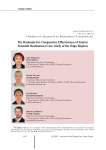
Статья научная
The article presents the analysis of long-term tourism development programs of the Volga Region. Great attention is given to the sector's financing measures set out in development programs. Domestic and foreign tourist potential assessment methods are analyzed. Tourist potential dynamics of the Volga Region is studied based on expert opinion. Using econometric approach the authors study the correlation between tourism investments and incomes of the Volga Region for the past six years - from 2009 to 2014. The analysis was carried out using statistics provided by the Russian Tourism Association and the Federal State Statistics Service of the Russian Federation by category of profitability from paid tourist services and from hospitality and catering services. The conducted analysis helped construct the figures showing the differentiation of the Volga regions by tourism investment efficiency and tourist potential realization. It is shown that tourist potential of the territories and its realization are highly differentiated...
Бесплатно

The regional aspects of food security
Статья научная
The essential questions of food security, the main factors of regional food security by example of the Komi Republic, the conceptual frameworks of food provision and the development lines of the regional agrarian sector are considered in the article.
Бесплатно

The role and place of the public chambers in the context of civil society and social capital
Статья научная
The article provides an overview of the conceptual foundations of civil society and social capital theories. It reflects the views of R. Putnam, one of the most reputable theorists of modern civil society. The hypothesis of a possible positive influence of the state over the development of civil society through special facilitative procedures is put forward in the article. The activity of the Public Chamber in the Vologda Oblast is considered as an example of establishing a special practice - cooperative confrontation that is used both for implementing the interests of developing civil society in coordination with the authorities and forming the constructive civic culture.
Бесплатно
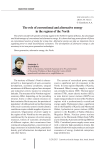
The role of conventional and alternative energy in the regions of the North
Статья научная
The article considers the specifics of energy supply in the Northern regions of Russia, the advantages and disadvantages of conventional and alternative energy. It is shown that large power plants will focus on conventional sources of energy for a long time. Alternative energy can play an important role in supplying power to small decentralized consumers. The development of alternative energy is also necessary to test new power generation technologies.
Бесплатно
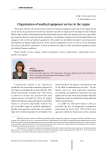
The role of economics in the evolution of public conscience
Статья научная
The article considers the place of economics in the evolution of social consciousness. It substantiates that the implementation of conceptual provisions of economic theories prevailing at the present time in the Russian practice does not provide the solution of national development problems. In the author's opinion, the economic science should contribute to the formation of public consciousness in which the primacy belongs to the function of creation.
Бесплатно

The role of individual responsibility in territorial development
Статья научная
Within regional science, there has always been a great deal of emphasis on examining territorial differences. When defining development directions, it is important that territorial levels can be identified individually. One of the characteristics of settlements is a lively social life. This will provide an opportunity for the population to live their individual social and cultural life. In settlements where the population is active, people usually love to live, and their inhabitants want to improve their physical and cultural life. They work like a great family, they form a community. In some of cases, settlement leaders place great emphasis on community development. The leaders of the settlement formally try to ensure the development of the settlement with local regulations, however they also have informal tools that they can use for the benefit of their community. In addition to executives, the individual has an important role in community building. The active behavior of individuals in community building can greatly contribute to a successful settlement. The study examines several local communities with qualitative and quantitative modifiers, and presents success factors within each community. The purpose of the study is to approach communities from a new perspective. Previous research has generally examined communities on the basis of their characteristics, ethnicity (minorities), spatial concentration (school communities). This study attempts to highlight the relationship between territorial development and individual responsibility, taking into account all aspects of communities. It is important to note that the purpose of this study is not to present complete research findings (correlation studies on individual factors: age, educational attainment, income, and their impact on communities), partly because of the scale and partly because of future research plans. The research results confirm that the level of development and development potential of the regions are largely determined by the composition of the human factor living in the given space. Decisions made by decision-makers taking these principles into account can really contribute to the development of areas. Scientific study of such development results coud be a goal for future research.
Бесплатно
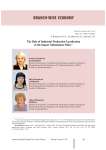
The role of industrial production localization in the import substitution policy
Статья научная
The article is devoted to defining the role of localization of industrial production in the implementation of the import substitution policy. The methodological framework of the research consists of the system approach, methods of structural, object, functional, and statistical analysis, as well as the method of expert estimations. The article reviews the concept of “import substitution” and “localization”; it is concluded that the implementation of the import substitution policy is inextricably linked with the localization. It provides examples of successful localization policy in individual industries (automotive, pharmaceutical and railway engineering), proves its effectiveness in creating high-tech industries for industrial output. The mechanism of localization in the railway engineering sector, whose competitiveness is currently provided largely by imported technology, is discussed in the case of locomotive engineering and rolling stock manufacturing for high-speed operation...
Бесплатно
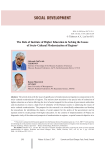
Статья научная
The article deals with the issue of significance of institutional and regulatory components in the socio-cultural modernization of regions. The authors draw attention to the special role of institution of higher education as a factor affecting the level of social support for the actions of government authorities and mechanisms to ensure a high level of solidarity of the Russian society in addressing the issues of socio-cultural modernization. The purpose for the research is to scientifically substantiate and develop the procedures for identifying the degree of social support for the policy of the government and its separate units by social groups with higher education. In the context of implementation of Project on diagnostic study of the status and prospects of modernization in regions, a special research objective is to assess the correlation between the concentration of people with higher education in regional structures and types of modernization, the equilibrium in the process of regional modernization...
Бесплатно

The role of local communities in the development of small territories
Статья научная
The paper studies the participation of local communities in the development of small territories and the conditions that increase public involvement in the processes of spatial development at the local level. We apply a socio-spatial approach to study local communities combined with an action-activist concept to spatial development. In the theoretical part, we consider the main approaches to the study of local communities and their role in the territories’ development. We define the basic characteristics of the local community: social community; a common space, place; common interests, living conditions; ties, interaction. We provide the mechanisms of local community’s participation in the development of territories. The empirical part of the study is based on data from the opinion poll, conducted in two large cities and five small ones of the Vologda Oblast in 2021 (N=1550). We consider the average values for large and small cities and compare the indicators of the local community’s participation in the development of territories to reveal the features of this process. According to subjective estimates, we find that the main actors of territorial changes are the governing bodies and the local community, while business is practically not responsible for the development of the territories in which it operates. In small cities, compared to large cities, the local community is more focused on the development of territories and is aware of its responsibility. The local community shows a higher potential and level of participation in initiatives. In almost all practices, the share of participants in small cities is higher than in large cities. We determine that a lack of teamwork experience hinders community engagement in spatial development issues. As promising areas, we consider institutionalized mechanisms of local community participation in territories’ development, such as participatory budgeting and project activities as part of the work of non-profit organizations.
Бесплатно
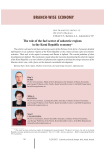
The role of the fuel sector of subarctic regions in the Komi Republic economy
Статья научная
The article considers the approach towards the improvement of the management of regional development, which is based on determining the character and direction of the influence of a number of factors on regional development by applying the method of principal components. The approbation of the suggested approach to the statistical data of Russian regions for 2000-2010 in terms of the region’s major subsystems indicated the absence of progressive development tendencies, as well as made it possible to determine the character and the direction of the influence of the investigated factors, which in the regional management practice permit taking the regions to the sustainable development pathway, to be determined.
Бесплатно
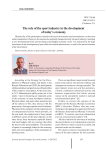
The role of the sport industry in the development of today's economy
Статья научная
Historically, all the sport projects related to the sector of recreation and entertainment, so they were rather unimportant. However, the situation has radically changed recently: the sport industry is reaching a new developmental level and becoming a full-fledged economic sector. It is indicated by the huge investments in the development of sport clubs and related infrastructure, as well as the special attention of the Government.
Бесплатно
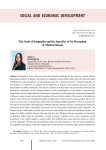
The scale of inequality and the specifics of its perception in modern Russia
Статья научная
Inequality is a key socio-economic development challenge for the world as a whole and for individual countries. In Russia, the problem of inequality is particularly acute, since the scale and depth of differences in the population’s income greatly exceed the “conditional levels” of normal inequality. In this regard, it is important to prevent the development of negative socio-political processes and the deterioration of public sentiments. The article’s purpose is to determine the peculiarities of the Russian population’s perception of the existing inequality and its manifestations in the country. Using the data from Rosstat and the Organization for Economic Cooperation and Development, we prove that inequality in Russia is large in scale and persists throughout the post-reform period of the country’s development without a clear focus on reducing the depth of polarization of the extreme income groups. We use the data of a cross-country representative study under the program ISSP, conducted in 2019, to examine the perception of inequality by the population of Russia and some foreign countries, specifically the subjective assessment of the depth of inequality, its fairness, the role of the state in reducing income disparities, the features of the redistribution system (role of taxes), accessibility of health and education services, the degree of conflict (dislike) between the poor and the rich. We show that the perception of inequality by Russians differs from the perception of other countries’ residents with a more expressed critical assessment of the depth, injustice, social conflict and ineffectiveness of government actions to reduce income disparities. We find that the population does not show tolerance to non-monetary dimensions of inequality, considering unfair the opportunity of rich people to purchase high quality medical and educational services. We reveal that there are no significant differences in the perception of inequality in different socio-demographic and socio-economic groups of the population. Attention is drawn to the fact that the subjective perception of inequality lies to a greater extent in the field of ideas about a fair social order than it is unambiguously determined by the level of income.
Бесплатно

